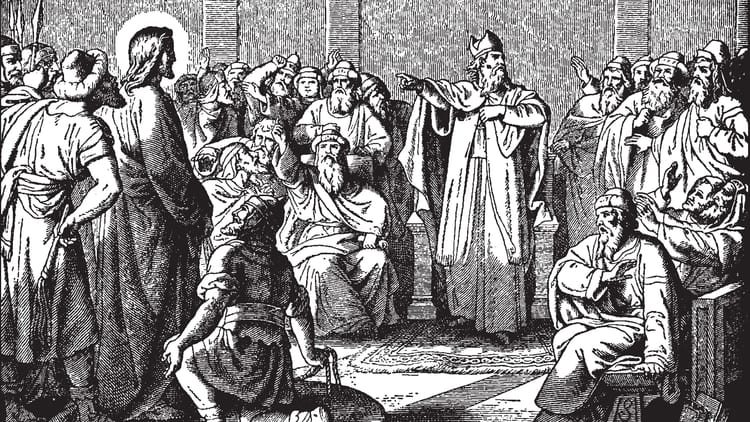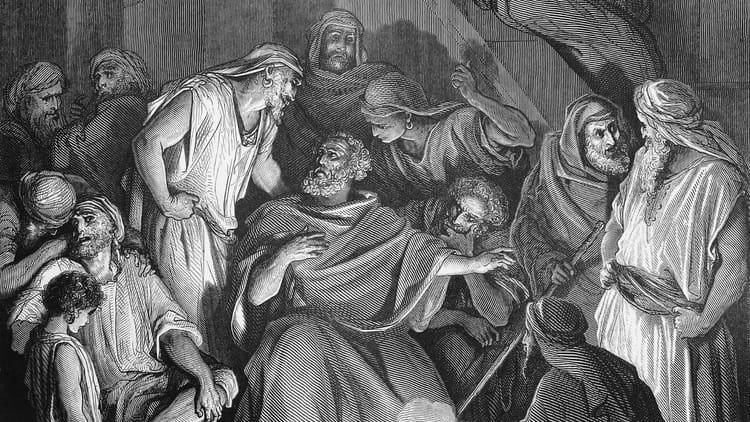Hungry (Mark 6:30-44)

At first glance, the story that we’ve just read is a simple one. It’s one that we tell our children in Sunday school. Jesus sees a need and miraculously provides for it using only a few loaves of bread and fishes. It’s a story that warms the heart.
But as usual, there’s more than meets the eye in this passage. This morning I’d like to simply look at three things that this passage shows us: what we need; how Jesus meets that need; and what this means about our role today.
First, let’s look at what we need.
The apostles have just returned from preaching and teaching and healing. They were so overwhelmed by ministry that they didn’t even have time to eat. Jesus suggested that they get away to a solitary place. But before they even got there in the boat, verse 33 tells us, “But many who saw them leaving recognized them and ran on foot from all the towns and got there ahead of them.” You can imagine their disappointment. They needed to rest, but what they got was more ministry.
The apostles may have been disappointed, but Jesus saw the crowd and saw their need. Verse 34 says, “When Jesus landed and saw a large crowd, he had compassion on them, because they were like sheep without a shepherd.”
What does this mean, “sheep without a shepherd”? Thousands of years earlier, Moses was a leader over Israel. He brought the people out of Egypt and led them as they wandered through the wilderness for forty years. When Moses was about to die, we read that he said to God:
May the LORD, the God of every human spirit, appoint someone over this community to go out and come in before them, one who will lead them out and bring them in, so the LORD’s people will not be like sheep without a shepherd. (Numbers 27:16-17)
In other words, a shepherd was a leader who could lead and care for the people. God answered Moses’ prayer by telling him to appoint Joshua, who led Israel to battle as they entered the land that God promised them. When David was made king, the Lord said to him, “You will shepherd my people Israel, and you will become their ruler” (2 Samuel 5:2). But all of that paled compared to the promise God had made to them.
For this is what the Sovereign LORD says: I myself will search for my sheep and look after them. As shepherds look after their scattered flocks when they are with them, so will I look after my sheep…There they will lie down in good grazing land, and there they will feed in a rich pasture on the mountains of Israel. I myself will tend my sheep and have them lie down, declares the Sovereign LORD. (2 Samuel 34:11-15)
Do you see what this means? The people came with a need. You don't run faster than a boat on a lake without a good reason. They came wanting more of what Jesus had to offer. Maybe some of them wanted more teaching or healing. Some of them may have been coming for political deliverance. I’m sure many of them didn’t even know what they were looking for.
But Jesus saw them and recognized their real need. He looked at the crowds, and he saw there deep hunger for something they longed for but had never experienced. They were starved and impoverished, and nobody seemed to care. Their forefathers had even experienced hints of what they longed for, but they had never experienced the real thing.
Dietrich Bonhoeffer describes their need this way: “There were questions but no answers, distress but no relief, anguish of conscience but no deliverance, tears but no consolation, sin but no forgiveness.”
Now, I know that we’re a long way from where these people were. But the irony is that this passage also reveals our need. Mother Teresa once looked at the Western world and said, “The spiritual poverty of the Western world is much greater than the physical poverty of our people. You in the West have millions of people who suffer such terrible loneliness and emptiness.” Did you hear that? We have everything – success, family, wealth, pleasure – and yet there’s still a sense that something is missing.
Most of us can’t even put our finger on what the problem is. As a result we try all kinds of things to address our deep hunger. One author said:
It is the desire for God which is the most fundamental appetite of all, and it is an appetite we can never eliminate. We may seek to disown it, but it will not go away. If we deny that it is there, we shall in fact only divert it to some other object or range of objects. And that will mean that we invest some creature or creatures with the full burden of our need for God, a burden which no creature can carry. (Simon Tugwell)
We all have this hunger within us. We can’t deny it, because the hunger comes from our most fundamental appetite, one that we can’t eliminate. Because we don’t recognize our deepest hunger, we try to fill the hole our relationships, our careers, our accomplishments, our positions, our experiences. But none of these can fill the hunger, because our need can only be met by God. It puts pressure on ourselves, our careers, our families, because we are putting a pressure on them that they were never meant to bear. Jonathan Edwards put it this way:
The enjoyment of [God] is the only happiness with which our souls can be satisfied…. Fathers and mothers, husbands, wives, or children, or the company of earthly friends are but shadows, but enjoyment of God is the substance. These are but scattered beams, but God is the sun. These are but streams, but God is the fountain. These are but drops, but God is the ocean.
So this passage first confronts us with our need. We are experiencing a deep hunger that we’ve never had satisfied, and nothing has filled it no matter what we try.
Secondly, then, let’s look at how Jesus meets that need.
Verse 34 says, “When Jesus landed and saw a large crowd, he had compassion on them, because they were like sheep without a shepherd. So he began teaching them many things.” Later on he feeds them miraculously with bread and fish. From this passage we learn that Jesus meets our deepest spiritual hunger in two ways. First, he feeds us with his Word. Then he points us to the future feast in which our deepest needs will be finally satisfied.
When Jesus saw the need of the people, he responded first by nourishing them with his Word. Now don’t forget that we are talking about an ultimate hunger, a hunger that nothing in this world can fill. What Jesus is showing us here is that what they really needed to hear is a word from God. If his teaching was anything like what we read in the rest of the Gospel of Mark, then what they really needed to hear was about the arrival of the Kingdom of God, that God is setting things right, and that they needed to repent and believe. It’s why we spend time looking at God’s Word every Sunday. What we need at our deepest level is found in God’s Word for us. God reveals himself through his Word, and we desperately need it. Jesus himself makes a connection between the Word of God and our deepest hunger. When he was tempted by Satan, Jesus said, “People do not live on bread alone, but on every word that comes from the mouth of God” (Matthew 4:4). What we long for most can only be met through the God who is revealed in His Word.
So Jesus meets their deepest need through nourishing them through his Word. But then he does something that points forward to when our deepest needs will be met and completely fulfilled. He gets them to sit down in groups, takes a quantity of food that would barely even feed the Apostles, and nourishes the entire crowd so that, according to verse 42, they were all satisfied. Not only that, but there were leftovers. What is all this about?
In the Gospels, miracles are never random displays of power. Jesus never does something to just demonstrate his power or wow the audience. Every miracle is a signpost that points to when the kingdom of God is fully here. So when he heals, he’s pointing to the day that there will be no illness. When he casts out demons, he points to the day when evil will be defeated. When he raises people from the dead, he points to the day when there will be no more death. And when he feeds the people in this miracle, he points to the day when there will be no more hunger. Our deepest longings will be met, and we will be fully satisfied. In the Gospel of John, Jesus said, “I am the bread of life. Whoever comes to me will never go hungry, and whoever believes in me will never be thirsty” (John 6:35).
What Jesus points us to is the banquet that we’ve always longed for, the one that’s promised in the ancient Scriptures. Jeremiah had written:
They will come and shout for joy on the heights of Zion;
they will rejoice in the bounty of the LORD–
the grain, the new wine and the olive oil,
the young of the flocks and herds….
I will satisfy the priests with abundance,
and my people will be filled with my bounty,”
declares the LORD.
(Jeremiah 31:12, 14)
And God said through Isaiah:
Come, all you who are thirsty,
come to the waters;
and you who have no money,
come, buy and eat!
Come, buy wine and milk
without money and without cost.
Why spend money on what is not bread,
and your labor on what does not satisfy?
Listen, listen to me, and eat what is good,
and you will delight in the richest of fare.
(Isaiah 55:1-2)
There will come a day, Jesus said, when our deepest longings will be met, when we will eat and be completely satisfied, and there will be no more hunger, no more illness, no more death, no more evil and injustice. What we long for will finally be true.
And here’s the thing: we haven’t experienced this yet, but we will. And knowing that this is coming is bread enough for today. Knowing this helps us endure almost anything. Paul wrote, “I consider that our present sufferings are not worth comparing with the glory that will be revealed in us” (Romans 8:18).
So Jesus nourishes us with his Word, and he points us to the day when our hunger will ultimately be fulfilled. But then there’s a hint of something else. Did you notice verse 41? “Taking the five loaves and the two fish and looking up to heaven, he gave thanks and broke the loaves. Then he gave them to his disciples to set before the people. He also divided the two fish among them all.” Taking bread, giving thanks, and breaking it. In a few chapters, Mark is going to write these words: “Jesus took bread, and when he had given thanks, he broke it and gave it to his disciples, saying, ‘Take it; this is my body'” (Mark 14:22).
Jesus meets our deepest hunger with the bread we’re about to eat. But he did so at infinite cost. Bread must be broken if it’s going to nourish someone. Unbroken bread will never meet anyone’s hunger. Jesus took bread and gave it to his disciples and said, “This is my body, which is for you; do this in remembrance of me” (1 Corinthians 11:24). At the cross, Jesus who is the bread of life was broken so that we may be filled.
In a few minutes, we are going to come to Communion. Jesus told us to regularly celebrate Communion so that we could look back to what he did for us at the cross. He forgave all of our sins, defeated evil, and conquered sin and death. But it also looks forward to the day when we will eat at the banquet we’ve always wanted, to when our deepest hungers will be finally satisfied. The reason he told us to celebrate Communion so often is so that we would never forget what he has done for us, and so that we would never forget that it he is the one who fills us, who meets our deepest needs.
The banquet has an infinite cost, but it’s been paid for. And now anyone can come and eat freely. There’s an open invitation. The only requirement is that you come hungry.
We’re going to come to that in just a minute, but there’s one more thing we need to see in this passage. We’ve seen our need. We’ve seen how Jesus meets our deepest need. This passage reveals one more thing.
Let’s finally look at what this passage says about our role today.
What is the role of the apostles in this passage? They are dispensers of bread. All they do is take what Jesus has given them, and they pass it out. That’s pretty much all we are as well: dispensers of bread. We have nothing to offer people other than what Jesus has given us to give to them.
The biggest thing that we have to offer anyone is the bread of life, Jesus Christ. The kindest thing we can do is tell them about the Kingdom of God and invite them to the banquet where their needs can be ultimately satisfied. That’s all. There’s nothing more. We’re simply dispensers of the bread that Jesus has given us.
But we also need to see that it’s a pretty impossible task. There’s lots of sarcasm in the Bible, but I can’t think of a more sarcastic comment than the one the apostles made to Jesus in verse 37. The ESV gets at the sarcasm better than some translations. Jesus told them to give something to the crowd to eat. The disciples replied, “Shall we go and buy two hundred denarii worth of bread and give it to them to eat?” Two hundred denarii represented about 200 days’ wages for a laborer. The disciples were being a little testy in their response to Jesus. In their defense, they knew that what Jesus had told them was impossible. They didn’t have that kind of bread, and they didn’t have that kind of money. They were in way over their head.
And that’s just the point. Our struggle ever since then has been to believe that what Jesus offers us is enough, that the little pieces of bread and the little cups we’re about to use point us to what can meet the hunger of the whole world. Our greatest struggle is to do what Jesus tells us to do and pass out the bread, knowing full well that we’re in way over our heads, that what he’s asking us to do is humanly impossible. In the kingdom of God, only the inadequate are adequate. Only the hungry are filled, and only the inadequate get to pass out the bread to others.
I love how somebody put it:
It is not God’s intention that we should in ourselves be adequate for our tasks, rather He wants that we should be inadequate. If we only accept the tasks which we think are adapted to our powers we are not responding to the call of God. The church is always in a crisis and always will be. There will be difficulties, limitations, insolvable problems, lack of people and money, a menacing outlook, endless misunderstandings and misrepresentations. We are not only to do our work despite these things; they are precisely the conditions requisite for the doing of it.
Let’s pray.
Thank you for inviting us to the meal we’re about to celebrate. Thank you that it points us to what Jesus did for us, and to the day when our hunger will be fully and finally satisfied. Thank you for making us dispensers of bread. And thank you that in your kingdom, only the hungry are filled, and only the inadequate are adequate.
So we come hungry.
Come, all you who are thirsty,
come to the waters;
and you who have no money,
come, buy and eat!
Come, buy wine and milk
without money and without cost.





